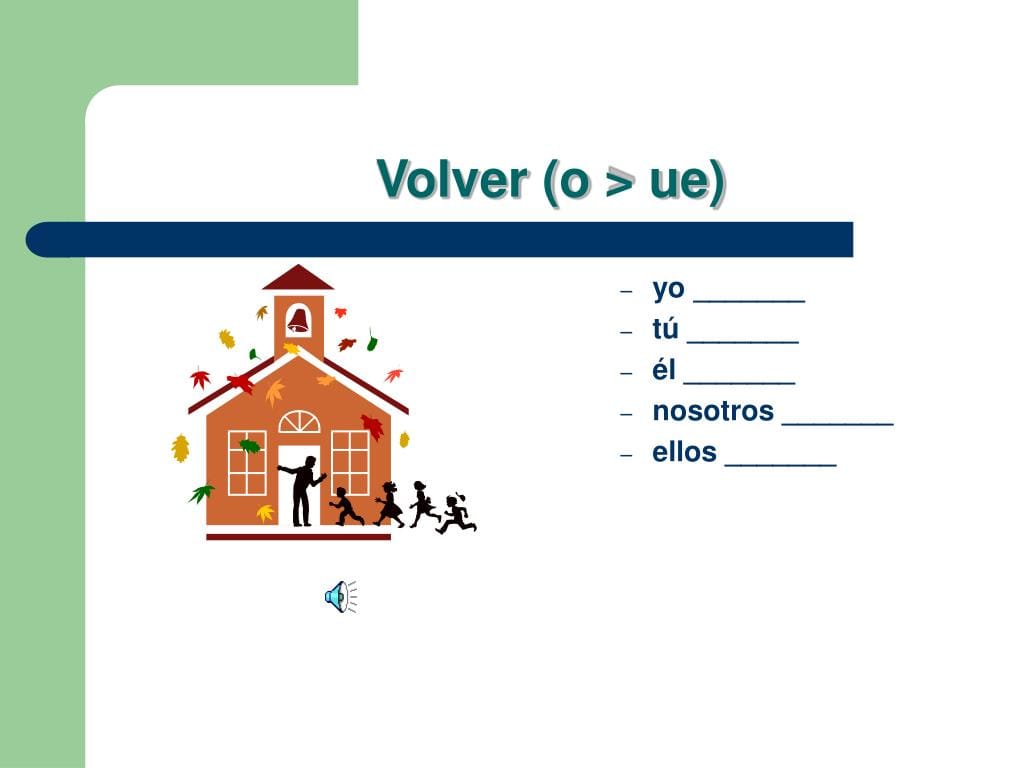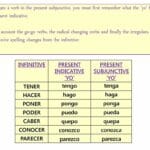Prepare yourself for an exciting linguistic journey as you delve into the world of Spanish verb conjugation. Enhance your communication skills by mastering the intricacies of both vender conjugation and volar conjugation.
Understanding the Volver Preterite
Let’s explore the preterite tense of volver, a common Spanish verb meaning “to return” or “to come back.” Volver is an irregular verb, meaning it doesn’t follow the typical conjugation patterns.
Conjugating Volver
Here’s how volver conjugates in the preterite:
| Pronoun | Conjugation | Example (meaning) |
|---|---|---|
| Yo | volví | (I) returned |
| Tú | volviste | (You, informal) returned |
| Él/Ella/Usted | volvió | (He/She/You, formal) returned |
| Nosotros | volvimos | (We) returned |
| Vosotros | volvisteis | (You all, informal Spain) returned |
| Ellos/Ellas/Ustedes | volvieron | (They/You all, formal) returned |
Using the Volver Preterite
The preterite tense describes completed actions in the past. For example:
- “Ayer, volví a casa temprano.” (Yesterday, I returned home early.)
- “Ella volvió de sus vacaciones la semana pasada.” (She returned from her vacation last week.)
Preterite vs. Imperfect
Spanish has another past tense called the imperfect, which describes habitual or ongoing actions. The key difference:
- Preterite (finished): “Volví a la biblioteca para devolver el libro.” (I returned to the library to return the book – One specific trip.)
- Imperfect (ongoing/habitual): “Volvía a la biblioteca todos los sábados.” (I used to return/would return to the library every Saturday – A repeated action.)
Common Mistakes with Volver
- Preterite/Imperfect Confusion: Ensure you understand the distinction between completed and ongoing past actions.
- Pronunciation: The stressed ‘o’ and the ‘v’ sound can be tricky. Practice listening to native speakers.
Current research suggests that making mistakes is part of language learning. Don’t be discouraged! The more you practice, the better you’ll become.
Vivía: Imperfect, Not Preterite
Vivía, meaning “I was living” or “I used to live,” is the imperfect tense of vivir (to live). It describes an ongoing state or habitual action in the past. The preterite forms of vivir (viví, viviste, etc.) express completed actions. The difference is subtle but important: “Vivía en España” (I was living in Spain) versus “Viví en España por un año” (I lived in Spain for a year).
Vivir Conjugation Tables
| Tense | Singular | Plural |
|---|---|---|
| Imperfect | vivía | vivíamos |
| vivías | vivíais | |
| vivía | vivían | |
| Preterite | viví | vivimos |
| viviste | vivisteis | |
| vivió | vivieron |
Linguists recognize regional variations in these tenses. Ongoing research may reveal further nuances. Continuous learning is key!
Vuelve vs. Vuelva: Indicative vs. Subjunctive
Vuelve (he/she/it returns) is present indicative, used for factual statements. Vuelva (that he/she/it return) is present subjunctive, used for desires, doubts, or possibilities. Both can also be commands: vuelve (informal) and vuelva (formal).
Volver in Present Tense
| Word | Mood | Example |
|---|---|---|
| Vuelve | Indicative | Ella vuelve a casa temprano. (She returns home early.) |
| Vuelva | Subjunctive | Espero que vuelva pronto. (I hope he/she returns soon.) |
Here’s the present tense conjugation of volver:
| Pronoun | Conjugation |
|---|---|
| Yo | vuelvo |
| Tú | vuelves |
| Él/Ella/Usted | vuelve |
| Nosotros/Nosotras | volvemos |
| Vosotros/Vosotras | volvéis |
| Ellos/Ellas/Ustedes | vuelven |
For example, “El tren vuelve a las seis” (The train returns at six) is a factual statement. But “Ojalá que vuelva el tren a las seis” (I hope the train returns at six) expresses a wish or uncertainty.
Ongoing linguistic discussions suggest nuances in subjunctive usage. Mastering these distinctions significantly improves your communication.
Volver in the Subjunctive
The subjunctive mood expresses wishes, doubts, and hypothetical scenarios. Volver changes its stem to “ue” in the present subjunctive (except for nosotros and vosotros).
Conjugating Volver in the Subjunctive
| Person | Conjugation |
|---|---|
| Yo | vuelva |
| Tú | vuelvas |
| Él/Ella/Usted | vuelva |
| Nosotros | volvamos |
| Vosotros | volváis |
| Ellos/Ellas/Ustedes | vuelvan |
Examples:
- “Quiero que vuelvas pronto” (I want you to return soon).
- “Dudo que vuelva a tiempo” (I doubt that he/she will return on time).
The present perfect subjunctive (haya vuelto, hayas vuelto, etc.) describes completed actions within a subjective context, like “Me alegro de que hayas vuelto” (I’m glad you returned).
Language is constantly evolving, and ongoing research continues to refine our understanding of grammatical nuances. Embrace the ongoing learning process!
- China II Review: Delicious Food & Speedy Service - April 17, 2025
- Understand Virginia’s Flag: History & Debate - April 17, 2025
- Explore Long Island’s Map: Unique Regions & Insights - April 17, 2025
















